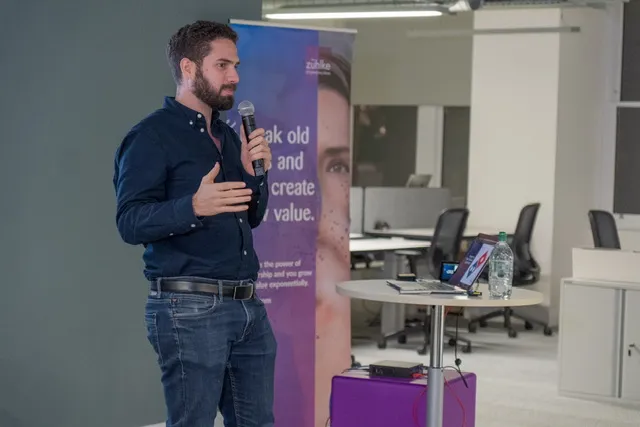Growing Your Tech Career: a Lead DevOps Engineer Story
Pleasure to meet you, I am Raul, Lead DevOps Engineer at Zühlke. I want to take you through my career transitions, starting with mobile development in Barcelona, moving towards backend engineering in London, and finally finding my path in DevOps. Dive in!
Published May 18, 2024
Imagine this - you're a teenager, and the computer is your favourite toy. You spend hours discovering every nook and cranny of this magical machine. Taking it apart just to understand how it works, and then putting it back together. You install all sorts of software on Windows and Ubuntu, just for the fun of it. Remember the dial-up internet? You even managed its connection settings!
So, when it was time to decide what to study after school, there was hardly a decision to make. It had to be Computer Science. It was not just a hobby, it was a passion that had turned into a mission. And that's how my journey into the tech industry began.
From 2014 to 2016, my friend from Catalonia, who lived in Barcelona, spoke about the diversity of his work in terms of projects and markets. He was employed by a global consultancy similar to Zühlke, now a global company.
In those two years, he experienced multiple markets, faced various challenges, and tackled numerous real-world problems. I, on the other hand, gained experience working with several startups, all of which no longer exist except for one. While working with startups was valuable, I sought to diversify the types of challenges and markets I was exposed to.
Dom, the best recruiter I've ever worked with, introduced me to Zühlke. I liked their vibe from day one. My interview with the CEO, Wolfgang, was very positive. He asked questions that reflected Zühlke's culture. In 2023, I created a video of Wolfgang discussing it that people can view here.
Zühlke has been a platform for my growth, allowing me to explore my curiosity. Suppose you view career growth as developing professional independence through skills, self-reflection, and value creation. In that case, you can grow anywhere - whether that's in your own company, another organisation, or at Zühlke.
Zühlke’s culture has allowed me to apply my skills across multiple ecosystems and industries, and in return, Zühlke has been able to deliver products that positively impact the world.
In 2011, I secured my first job in Barcelona after presenting a functioning BlackBerry mobile app written in Java during an interview. In 2013, I moved to London and began working as a mobile developer for a startup.
They soon needed help on the back end, so with the support of my colleagues, I transitioned to a Java Backend Software Engineer role. It was then that I learned the importance of writing tests and began identifying myself as an engineer rather than a developer, as engineering a software solution requires quality assurance, and testing is one way to ensure it.
I utilise principles from lean software development and focus on understanding one technology at a time. Each digital product I work on centres around a specific set of technologies. I invest a lot of effort in learning and understanding these technologies to deliver value quickly. This approach also enables me to assist my team members because I need a basic understanding of the technology to address their questions or issues.

"How would you act if you were tasked with saving 9,600 lives?" This question began my presentation at the London DevOps Exchange in 2023 (link) about how elements of DevOps contributed to saving lives during the creation of the NHS Covid-19 App.
This project, which saved more than 9,600 lives in 2020 and 2021, is my favourite. It had immense value for UK society and had a national, positive impact on people's lives. Despite its challenges and the intense intellectual effort it required, I cherished every single day of that project.
A team of people, including members from Zühlke, published a companionpaper in Nature, a highly respected publication. This paper discusses the 9,600 averted COVID-19 cases resulting from our efforts.
Developing a contact tracing app during a pandemic presented immense challenges. We had to protect identities while providing sufficient information for the government to navigate the crisis. We had to rapidly develop a cloud-based solution, onboard 70-80 engineers, and ensure the solution was built correctly in the shortest amount of time.
Trusting my colleagues and instincts, communicating frequently, removing as many obstacles as possible, and employing extreme programming practices such as Test-Driven Development (TDD) and pair programming, coupled with agile software development, were key. I have given a talk on this topic.
Use your Objectives and Key Results (OKRs) wisely to establish direction. Understand that setting easy objectives for your evaluation will result in just that - a pass. If you set high standards, you'll surpass your skills and abilities. If your mindset aligns with these goals, you'll receive the necessary support to achieve your objectives.
Navigate through the challenges of your career using your moral compass. Explore different markets and tech stacks, even those different from what you initially interviewed for. You can always have a conversation to return to your target track.
